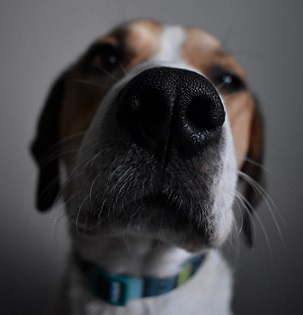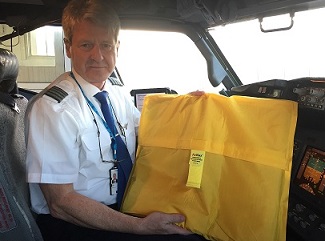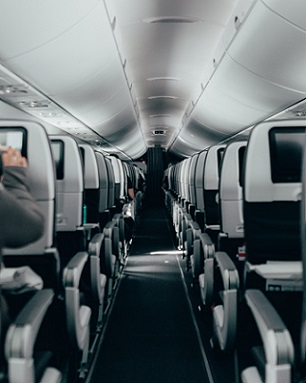 Dog sniffing. Photo by Hannah Gibbs on free photo website Unsplash.
Dog sniffing. Photo by Hannah Gibbs on free photo website Unsplash.
 A pilot with one of the AvSax lithium battery fire mitigation bags now on board 16,750 aircraft worldwide
A pilot with one of the AvSax lithium battery fire mitigation bags now on board 16,750 aircraft worldwide
 The last place you want a lithium fire is on board a passenger aircraft
The last place you want a lithium fire is on board a passenger aircraft
Specialist dogs are now being used to sniff out lithium-ion batteries in a bid to make transporting them safer and avert a potential aviation disaster.
And, in time, they could even be used to sniff out batteries in passengers’ hold luggage as lithium batteries should always be taken into the passenger cabin and never put in checked baggage.
If lithium batteries become faulty or damaged they could overheat and go into what’s known as thermal runaway causing them to catch fire or even explode which is why more than 100 aviation companies worldwide now use AvSax lithium battery fire mitigation bags in passenger cabins on board 16,750 aircraft.
But if the lithium batteries are in the hold they can burn at incredibly high temperatures-up to 900C(1652F)- automatic fire suppression systems could struggle to cope which could lead to disaster.
The trouble is there are rogue companies who try to hide the batteries in cargo and, without the dogs, there is little chance of finding them so they continue to pose a huge fire threat to airline safety.
Dogs are starting to be used more and more following a six-month trial in Lyon, France, in 2022 where two dogs checked several cargo types and found both lithium ion and lithium metal phone batteries every time. They could even find single batteries hidden within cargo.
Apparently the lithium smell is similar to nail varnish remover or polish which is why the dogs can sniff it out so well.
This pilot project was carried out by air cargo logistics company Worldwide Flight Services and dog detection experts Diagnose.
Oren Sapir, chief executive at international aviation security provider ICTS Europe group, said: “The challenge presented by lithium batteries is a major concern for aviation safety. Goods that are properly declared, correctly packed and, above all, in good condition present little risk, but it is clear that batteries or devices containing batteries are transported every day in passenger luggage and in airfreight shipments without being declared.
“By working in partnership with WFS we believe the results of our dog detection trial can be a very important breakthrough in ensuring the highest standards of aviation safety.”
Now, according to International Airport Review, dogs trained to sniff out lithium batteries hidden away in cargo are starting to be deployed in airports.
They are used by Qatar Airways Cargo in Hong Kong with its ground handler Hong Kong Air Cargo Terminals Ltd. The dogs are provided by MSA Security which has 11 canine training centres in the USA and operates a team of dogs at Hong Kong airport.
The dogs can pick up the smell from lithium batteries - either loose or in containers - and one dog even sniffed out a single power bank on pallets filled with other cargo.
More dogs are being trained with demand for their services set to increase over the coming years.
The International Air Transport Association has serious concerns about the transportation of lithium batteries which it classifies as ‘dangerous goods.’
It states: “Lithium batteries have become the preferred energy source to power a wide variety of consumer goods, ranging from mobile phones to children’s toys to cars and e-bikes. Though widely used, most people are not aware that lithium batteries are dangerous goods that can pose a safety risk if not prepared in accordance with transport regulations.
“The aviation industry has voiced concerns over the lack of awareness and the increasing number of incidents of intentionally mis-declared and non-compliant lithium batteries in cargo shipments and the need to address the safety risks to ensure the security of the supply chain is not compromised.”
To combat the problem it has set up a certification programme called the Center of Excellence for Independent Validators Lithium Batteries (CEIV Li-batt) designed to ensure the supply chain of lithium battery products through shippers, freight forwarders, cargo handling facilities and airlines comply with transport regulations.
Organisations that undergo training, assessment and validation requirements are granted a certificate issued by IATA and you can read more about that by clicking here.